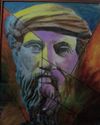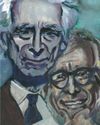
Both born in 1905, Viktor Frankl and Jean-Paul Sartre were two of the twentieth century's most influential thinkers about the human condition. Frankl was the father of logotherapy and Sartre of atheistic existentialism. While both rooted their thought in existentialist philosophy, sharing several key foundation-stones such as the centrality of human freedom, they had contrasting perspectives on the origins and implications of those shared ideas, and so reached diverging explanations of human existence. The purpose of this article is to summarise their ideas and compare how their thoughts converged and diverged over certain existential questions.
Comparing logotherapy and atheistic existentialism is particularly interesting because these two philosophical currents are the product of two minds which lived in the same historical period yet experienced it in dramatically different ways. This was partly by virtue of them belonging to different ethno-religious groups.
Existentialists Together & Apart
Viktor Frankl (1905-97) was a psychiatrist and neurologist from Vienna. He was the founder of logotherapy (from the Greek logos = meaning and therapeia = healing), a radical psychological doctrine based on the conception of meaning being the primary human motivational and (so) therapeutic force. Frankl was also an Austrian Jew, who in 1942 was deported with his family to the Theresienstadt concentration camp, where his father died of starvation and pneumonia. He spent the remaining three years of the war as a prisoner in four different camps. He was finally liberated on April 27, 1945, by which time his mother and brother had been murdered in the gas chambers of Auschwitz and his wife Tilly had died of typhus in Bergen-Belsen.
Diese Geschichte stammt aus der June/July 2024-Ausgabe von Philosophy Now.
Starten Sie Ihre 7-tägige kostenlose Testversion von Magzter GOLD, um auf Tausende kuratierte Premium-Storys sowie über 8.000 Zeitschriften und Zeitungen zuzugreifen.
Bereits Abonnent ? Anmelden
Diese Geschichte stammt aus der June/July 2024-Ausgabe von Philosophy Now.
Starten Sie Ihre 7-tägige kostenlose Testversion von Magzter GOLD, um auf Tausende kuratierte Premium-Storys sowie über 8.000 Zeitschriften und Zeitungen zuzugreifen.
Bereits Abonnent? Anmelden

FALLING DOWN
Thomas R. Morgan considers how personal identity is maintained, and how it is lost.

Pythagoras (570-495 BCE)
Daniel Toré looks beyond the mathematician to the philosopher.

Wordsworth & Darwin
Christine Avery wonders whether poetry can help us to deal with science.

Plants & Philosophy
Caroline Deforche sees similarities between gardening and philosophising.

Dr.Gindi sculptor, has a philosophical conversation with Richard Baron about sensation, life, infinity and, you guessed it, sculpture.
Dr. Gindi is one of Switzerland's foremost sculptors, whose work has been exhibited in many countries.

Thomas Aquinas on Extraterrestrial Life
Babatunde Onabajo tells us why Aquinas did not believe in aliens.

The Fire This Time
Tim Madigan on Ray Bradbury, Bertrand Russell and Fahrenheit 451.

Trust, Truth & Political Conversations
Adrian Brockless wants a recognition of human value in political debate.

Philosophy & The Crown
Vincent Di Norcia on monarchy and stability.

Technologists & Ethicists
Stephen L. Anderson laments inadequate moral insight among tech leaders.